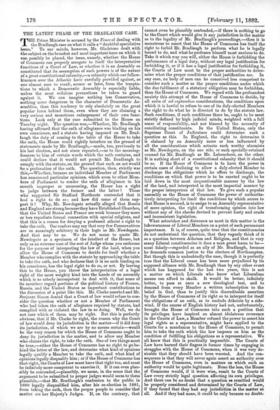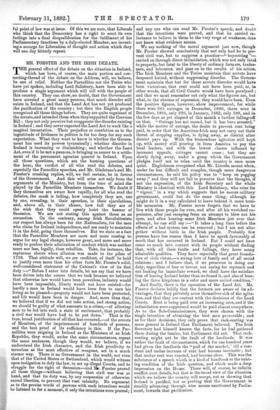THE LATEST PHASE OF THE BRADLAUGH CASE. T HE Prime Minister
is accused by the Times of dealing with the Bradlaugh case on what it calls a " doubtful speculative issue." To our minds, however, Mr. Gladstone dealt with the subject on the broadest and most important issue on which it can possibly be placed, the issue, namely, whether the House of Commons can properly arrogate to itself the interpretative functions of a Court of Law, or whether it is an Assembly so constituted that its assumption of such powers is of the nature of a great constitutional calamity,—a calamity which our fellow- kinsmen over the Atlantic have carefully provided against, as one almost sure to result, sooner or later, from the tempta- tions to which a Democratic Assembly is especially liable, unless the most sedulous precautions be taken to guard against it. We can imagine nothing less Conservative, nothing more dangerous in the character of Democratic As- semblies, than this tendency to rely absolutely on the great popular force behind them, even when they are claiming a very serious and monstrous enlargement of their own func- tions. Look only at the case submitted to the House on Tuesday night. The question was,—Whether, Mr. Bradlaugh having affirmed that the oath of allegiance was binding on his own conscience, and a statute having imposed on Mr. Brad- laugh the duty of coming to the table of the House to take the oath, the House could rightly interfere on the ground of statements made by Mr. Bradlaugh,--made, too, previously to his last election, and not since repeated,—as to the meaning- lessness to him of certain words which the oath contains, and could declare that it would not permit Mr. Bradlaugh to comply with the statute, on the ground that such an act would be a profanation of the oath. The question, then, strictly was this,—Whether, because an individual Member of Parliament has announced particular opinions, which seem to other Mem- bers of Parliament to render the oath of allegiance in his mouth improper or unmeaning, the House has a right to judge between the former and the latter ? Those who supported Sir Stafford Northcote contended that it had a right to do so ; and how did some of them sup- port it ? Why, Mr. Newdegate actually alleged that Russia and England are strong because they have Established Churches, that the United States and France are weak because they more or leas repudiate formal connection with special religions, and that this is a reason for denying a professed atheist a right to take the oath. Our readers may say that very few Conservatives are so amazingly arbitrary in their logic as Mr. Newdegate. And that may be so. We do not mean to quote Mr. Newdegate as a specimen of the intellect of the House, but only as an extreme case of the sort of Judge whom you enthrone for the purpose of interpreting the law of the land, when you allow the House of Commons to decide for itself whether a Member who complies with the statute by approaching the table to take the oath, and who declares that it is an oath binding on his conscience, has the legal right to do so, or not. By leaving this to the House, you throw the interpretation of a legal right of the most weighty kind into the hands of an assembly which is so utterly incompetent to deal with it, that some of its members regard portions of the political history of France, Russia, and the United States as important contributions to the discussion of a point like this. Mr. Clarke asserted and Mr. Serjeant Simon denied that a Court of law would refuse to con- sider the question whether or not a Member of Parliament who had taken the oath of allegiance required by statute, had .complied with or violated the law in so doing. Well, we do mot care which of them may be right. But this is perfectly obvious, that if Mr. Clarke be right, the reason why the Court of law would deny its jurisdiction in the matter—if it did deny its jurisdiction, of which we are by no means certain—would be the very reason for which the House of Commons ought to deny its jurisdiction in the matter, and to allow any Member who claims the right, to take the oath. One of two things must be true,—either the House of Commons has no right to go be- hind the letter of the law, and determine what kind of opinions legally qualify a Member to take the oath, and what kind of opinions legally disqualify him; or if the House of Commons has that right, the Courts of Law must have that right too, and must be infinitely more competent to exercise it. If it can even plan- .sibly be contended,—plausibly, we mean, in the sense that the Argument to be submitted to proper judges would seem to them plausible,—that Mr. Bradlaugh's confession to the public in 1880 legally disqualified him, after his re-election in 1881, from taking the oath, then the proper people to consider that matter aro her Majesty's Judges. If, on the contrary, that cannot even be plausibly contended,—if there is nothing to go to the Court which would give it any jurisdiction in the matter as to the legality of Mr. Bradlaugh's proceedings,—then it is monstrous to assert that the House of Commons has itself the right to forbid Mr. Bradlaugh to perform what he is legally bound to do, and what he professes himself most anxious to do. Take it which way you will, either the House is forbidding the performance of a legal duty, without any legal justification for forbidding it, or if it has a legal justification for forbidding it, the Courts of Law must be the proper authorities to deter- mine what the proper conditions of that justification are. In any case, no body of men can be conceived less competent to consider such a matter as the proper conditions under which the due fulfilment of a statutory obligation may be forbidden, than the House of Commons. We regard with the profoundest anxiety this attempt of the House of Commons to decide, by all sorts of ad captandwn considerations, the conditions upon which it is lawful to refuse to one of its duly-elected Members the right to do what he is directed to do by the statute law. Such conditions, if such conditions there be, ought to be most strictly defined by high judicial minds, weighted with a full sense of responsibility, and not biassed by the necessity of conciliating constituents. In the United States, only the Supreme Court of Judicature could determine such a question as this. In England, the right to determine it is claimed by an Assembly more or less influenced by all the considerations which actuate such worthy alarmists as Mr. Newdegate, on the one side, or such specially-retained counsel for Mr. Bradlaugh as Mr. Labouchere, on the other. It is nothing short of a constitutional calamity that it should be so. If the House of Commons is to have the power in certain cases of declining to allow a duly-elected Member to discharge the obligations which he offers to discharge, the conditions on which that power is to be exerted ought to be laid down in the most unquestionable manner by the law of the land, and interpreted in the most impartial manner by the proper interpreters of that law. To give such a popular assembly as the House of Commons the power of authorita- tively interpreting for itself the conditions by which access to that House is secured, is to assign to an Assembly representative of mere opinion, the right of transforming opinion into law without any of the checks devised to prevent hasty and crude and inconsistent legislation.
What astonishes and distresses us most in this matter is the lukewarmness of Liberal Members on a point of such paramount importance. It is, of course, quite true that the constituencies do not understand the question, that they vaguely think of it as a question between Atheism and Religion, and that in very many Liberal constituencies it does a man great harm to be— most falsely—regarded as an ally of Mr. Bradlaugh, because he demands common justice to the electors of Northampton. But though this is undoubtedly the case, though it is perfectly true that the Liberal cause has been more prejudiced by its supposed alliance with Mr. Bradlaugh than by any other event which has happened for the last two years, this is not a matter on which Liberals who know what Liberalism means can afford to skulk. It would be better, infinitely better, to pass at once a new theological test, and to demand from every Member a written subscription to the belief in God, than to justify this discreditable assertion by the House of Commons of its right so to interpret for itself the obligations of an oath, as to exclude Atheists by a side- wind. If the course of English history had not, unfortunately, brought the House of Commons into such a position that its privileges have inspired an almost idolatrous reverence in the Courts of Law, a Member refused the power to assert his legal rights as a representative, might have applied to the Courts for a mandamus to the House of Commons, to permit him to take the oath which the law imposes on him as the condition of fulfilling his obligations as a representative. We all know that this is practically impossible. The Courts of Law have burned their fingers in former times by engaging in struggles with the House of Commons, when it was very de- sirable that they should have been worsted. And the con- sequence is that they will never again assert an authority over the House of Commons, even in matters on which such an authority would be quite legitimate. None the less, the House of Commons would, if it were wise, remit to the Courts of Law every strictly legal question affecting its own privileges. And there can be no doubt that a question as remitted would be properly considered and determined by the Courts of Law, if they found that they had any jurisdiction in the matter at all. And if they had none, it could be only because no doubt- ful point of law was at issue. Of this we are sure, that Liberals who think that the Democracy has a right to erect its own feelings into a final disqualification for the fulfilment of his Parliamentary functions by a duly-elected Member, are invent- ing a scourge for Liberalism of thought and action which they will one day bitterly repent.















































 Previous page
Previous page